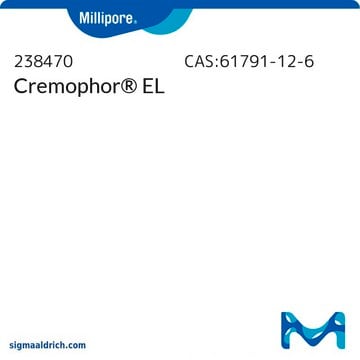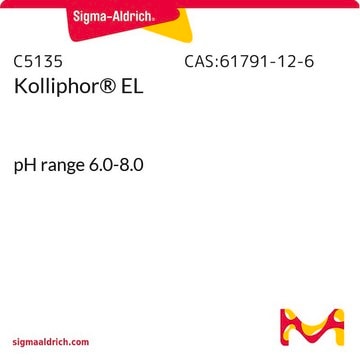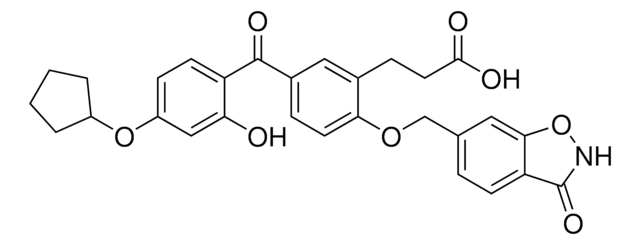SML0358
AA74-1
≥98% (HPLC)
Synonym(s):
[4-(4-Hydroxy-2,6-dimethylheptan-4-yl)-2H-1,2,3-triazol-2-yl](pyrrolidin-1-yl)methanone, [4-[1-Hydroxy-3-methyl-1-(2-methylpropyl)butyl]-2H-1,2,3-triazol-2-yl]-1-pyrrolidinylmethanone
About This Item
Recommended Products
Quality Level
assay
≥98% (HPLC)
form
film
color
colorless
solubility
DMSO: >15 mg/mL
storage temp.
2-8°C
SMILES string
CC(C)CC(O)(CC(C)C)c1cnn(n1)C(=O)N2CCCC2
InChI
1S/C16H28N4O2/c1-12(2)9-16(22,10-13(3)4)14-11-17-20(18-14)15(21)19-7-5-6-8-19/h11-13,22H,5-10H2,1-4H3
InChI key
GXBVPGCIMCIASQ-UHFFFAOYSA-N
Biochem/physiol Actions
The APEH gene is deleted in some cancers, in which it has been proposed to serve as a potential tumor suppressor, and is involved in the degradation of oligomeric amyloid-beta which could make it a new target for therapy aimed at reducing neurodegeneration in Alzheimer′s disease. AA74-1 is the first selective tool for studying APEH activity.
Storage Class
11 - Combustible Solids
wgk_germany
WGK 2
flash_point_f
Not applicable
flash_point_c
Not applicable
Certificates of Analysis (COA)
Search for Certificates of Analysis (COA) by entering the products Lot/Batch Number. Lot and Batch Numbers can be found on a product’s label following the words ‘Lot’ or ‘Batch’.
Already Own This Product?
Find documentation for the products that you have recently purchased in the Document Library.
Our team of scientists has experience in all areas of research including Life Science, Material Science, Chemical Synthesis, Chromatography, Analytical and many others.
Contact Technical Service








